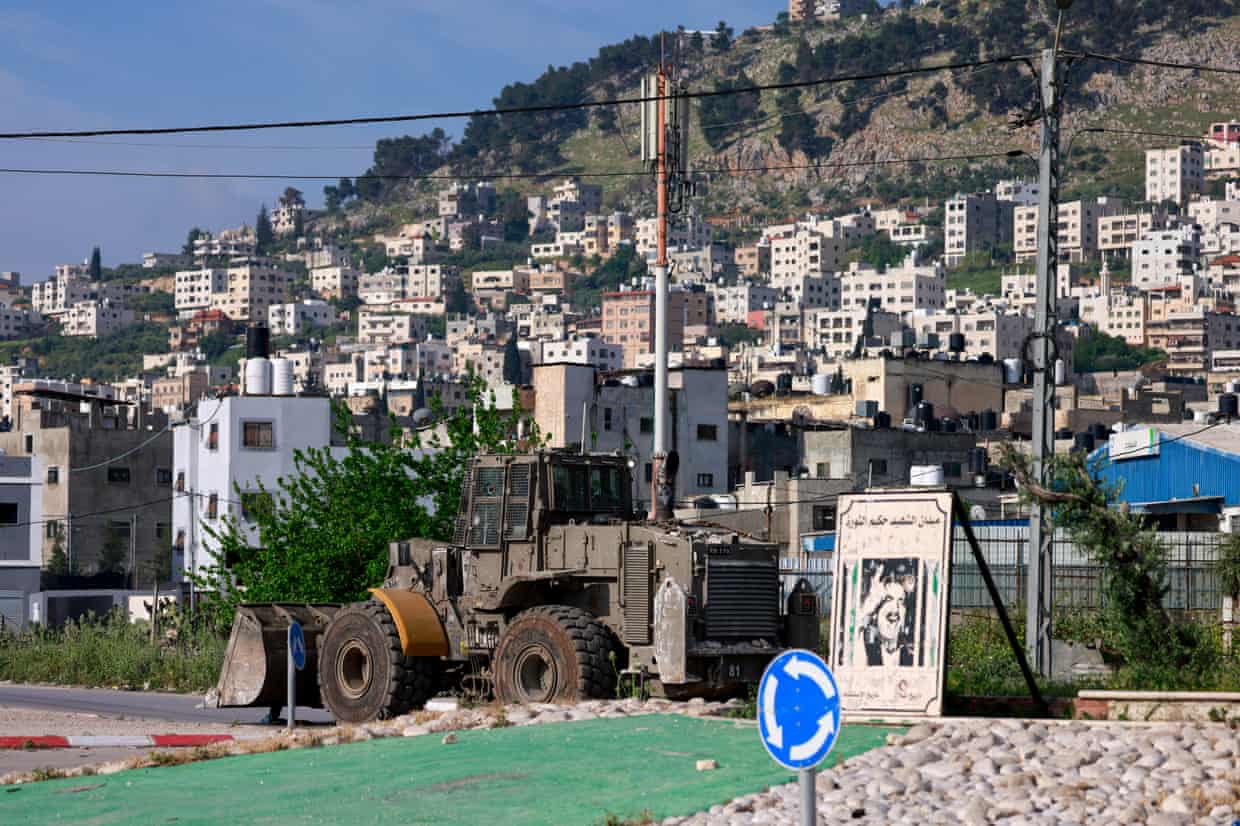Correspondences World Leaders
After six months of war, I fear we may lose Palestine completely
Source: The Guardian
Published April 9, 2024
Israel’s onslaught has been on a scale never seen before. I spend my days searching for hope
.png)
A Palestinian family continues to live in the rubble of their destroyed house in Gaza City, 7 April 2024. Photograph: Anadolu/Getty Images
_________________________
Editor’s Note | Sunshine Breaks Through the Clouds. Always!
I look forward to reviewing your new book, 'What Does Israel Fear From Palestine’ (publishing date: 7 June 2024).
Dear Raja, the majority of the people on all divides crave peace. Nonetheless, a minority of ‘kill, get killed’ extremists continue to tyrannize the majority who long for life, 'to live, let live.'
The people in Israel-Palestine — on both sides — must democratically replace their leadership. Another Nelson Mandela must rise from the ashes. We must work toward a one-state democracy, to quote Martin Luther King, Jr. “a beloved community for all.”
The present remnants and half-breeds of the former Judeans of 2,000 years ago do not need to fear the present indigenous Palestinians, many of whom are descendants of the half-breeds and remnants of Israel, cited in the Gospels 2000 years ago.
It is time for both to recognize the other by saying, “Welcome home.”
Raja, sunshine will break through the clouds. BELIEVE!
_________________________
Six months into Israel’s murderous war on Gaza, I spend my days in Ramallah reading the devastating news, feeling helpless and heartbroken. Yet one morning, I turned instead to Lyndsey Stonebridge’s excellent book on Hannah Arendt in which the author observed: “It is when the experience of powerlessness is at its most acute, when history seems at its most bleak, that the determination to think like a human being, creatively, courageously, and complicatedly matters the most.” I wonder whether those in Israel who feel powerless against the majority who want the continuation of the seemingly endless war; or us Palestinians, the victims of the full thrust of Israel’s might and expansionist agenda, are succeeding in doing that. So far, the evidence indicates that we are not.
By now several things have become clear. The first is the re-emergence in Israel of the Jewish ultra right; settlers and Jewish supremacists with their uncompromising expansionist agenda. It was as though this recalcitrant group was waiting for the opportunity to accelerate the pursuit of its colonial objectives. Already, not only is the Gaza Strip transformed but so is the West Bank, fragmented as it is by roadblocks and locked iron gates restricting access to villages, and settlers continuing to expel Palestinians from their land. As for Gaza, plans are already being prepared for settling the north by Israeli Jews.
For 75 years we Palestinians have been demanding Israeli recognition, if not an apology and amends, for the horrors committed against us during the first Nakba of 1948, when more than 700,000 were forced out of their homes in what became Israel. Now the tragedy has been compounded. This makes me feel that I spent the last 50 years of my life getting used to the loss of Palestine of my parents; and that I might spend the remaining years of my life trying to get used to the loss of Palestine in its entirety.
This war has exposed the profound weakness of the secular liberals in Israel and their near-total rallying behind the supposed might of the Israeli army while failing to consider the longer-term consequences of their army’s murderous excesses. There is a distressing lack of readiness among the Israeli Jewish population to pursue peace with its neighbors, and an almost unchallenged commitment to the use of force to destroy Palestinians regardless of the human cost. One Israeli friend told me despairingly, “I’m a minority in a minority of a minority.”
Already more than 33,000 people have been killed by the Israeli army in Gaza. There is also an apparent acceptance by a majority of the Israeli people of the government’s political line that Hamas are “human animals”, coupled with a strong belief that by peddling images of the crimes it has committed against Israeli civilians, the world would excuse the destruction of an entire civilian population in Gaza. Such accusations as placing ammunition in hospitals and using civilians as human shields are repeated seemingly with no awareness that, as the Israeli columnist B Michael has pointed out, these same tactics were used by Israel in its war against Britain, and later against the Palestinians, when weapons were hidden in Hadassah hospital and civilian settlements were placed strategically.
The Israeli crimes in Gaza are unprecedented and immeasurably larger than what we’ve experienced at any time in the past. I asked my Israeli friend where were the voices of reason and compassion who took to the streets after the Sabra and Shatila massacre in Lebanon in 1982. He answered that then Israel was a different country.

An Israeli military bulldozer patrols the Balata refugee camp in the northern West Bank on Monday, following a raid on the camp. Photograph: Jaafar Ashtiyeh/AFP/Getty Images
The war has also exposed the failure of Hamas to have anticipated and prepared its civilian population for Israel’s response. The organisation succeeded in carrying out a complicated military operation, indiscriminately killing Israeli civilians in violation of international humanitarian law. It has also subjected its people to unmitigated vengeful onslaught by its adversary. As the Palestinian population in northern Gaza goes hungry, anger at the organisation may rise.
The iron-clad support of Israel by the US has also been confirmed. Despite what one former senior UN official described as probably the highest kill rate “since the Rwandan genocide of 1994”, the flow of arms to Israel from its ally continues unabated.
The Gaza war will eventually end. I dread to think, when this finally happens, how many more deaths will be added to the tens of thousands that have already happened; just as I dread watching more images of the devastation in Gaza when the Strip is opened up to journalists. Then there is the bitterness that is sure to be felt on the part of the Israeli hostages and their families, whether or not they emerge alive. We will have to reckon with all that. After such horrors, how will we Palestinians and Israelis manage to live together in this sliver of land we both call home?
While the monstrous war rages in Gaza, another sort of war is taking place in the West Bank. After the 57-year-long Israeli occupation of the territory, Palestinian farmers have been mainly deprived of their land and water. There has been a transformation from agriculture to a service economy with a strong reliance on employment in Israel. But since the start of the war, most Palestinian labourers have been prevented from returning to work there, except for those working in Israeli settlements in the West Bank. Many have become impoverished from having no work.
In Ramallah, as in other cities in the West Bank, land prices have rocketed because of the scarcity of land and restrictions on growth due to Israeli discriminatory planning schemes. With the city confined to a small space, every plot has to be used to the maximum. The only option left is to expand vertically. And so I live with the constant sound of digging. Those in Gaza could not compete with Israel’s air power so they had to protect themselves and conduct their fighting from underground tunnels. On most days, dominating the skies overhead are jets on their way to Gaza to carry out more devastating raids on civilians.
This makes me wonder when we will be able to climb out of our trenches. To paraphrase Siegfried Sassoon, when will “hope, with furtive eyes and grappling fists, [not] flounder in mud”? We will then emerge from the depth of our misery and yet again be able to flourish in our history-burdened region of the world.
Raja Shehadeh’s book What Does Israel Fear From Palestine? will be published on 7 June
LATEST OPEN LETTERS
-
13-02World Peace
-
05-12My scream to the world
-
16-11To Syria and Bashar al-Assad
-
16-11To Palestine
-
24-10Japan should withdraw from the World Health Organization (WHO) and the United Nations (UN), WHO's controlling parent body, to protect the basic human rights and lives of its citizens.
-
09-08Open Letter to António Guterres: Will the UN Protect Our Rights and End Our Suffering?
-
09-06Urgent Appeal
-
07-05Protect Our Great Earth And Nation!
-
09-03Peace And Love!
-
06-02Non military defence of Ukraine
VIRTUAL POST OFFICE
PETITIONS
LINKS
DONATION
Latest Blog Articles
-
01-05Our Wednesday News Analysis | How an 'antisemitism hoax' drowned out the discovery of mass graves in Gaza
-
30-04The Rafah invasion will be catastrophic
-
30-04Craig Murray: Worse Than You Can Imagine
-
30-04How an 'antisemitism hoax' drowned out the discovery of mass graves in Gaza
-
29-04The Evangelical Pope | Strive to Be YOU!
-
25-04Our Friday News Analysis | What the World Reads Now!
-
24-04Our Wednesday News Analysis | Israel’s Genocide in Gaza Is a World Historical Crime
-
23-04From Namibia to Gaza With Love
-
22-04The Evangelical Pope | Salt and Light
-
18-04Our Friday News Analysis | What the World Reads Now!
-
17-04Our Wednesday News Analysis | An Iranian Retaliation is Coming: This is Why – ANALYSIS
Latest Comments
 One of the most important and illuminating articles that I …
One of the most important and illuminating articles that I …
Comment by Benjamin Inbaraj And what's wrong here?
After all, there is the homeland …
And what's wrong here?
After all, there is the homeland …
Comment by Isac Boian Does this reinforce or deny my argument that Israel is …
Does this reinforce or deny my argument that Israel is …
Comment by Edward Campbell Many 'say' they support the Palestinian cause but do little …
Many 'say' they support the Palestinian cause but do little …
Comment by Philip McFedries The UN is strangled by the "war for profit" cabal …
The UN is strangled by the "war for profit" cabal …
Comment by Philip McFedries I can't read the printing on the map.
I can't read the printing on the map.
Comment by Philip McFedries Good news!
Good news!
Comment by Philip McFedries
.png)
COMMENTS
This article has 0 comments at this time. We invoke you to participate the discussion and leave your comment below. Share your opinion and let the world know.